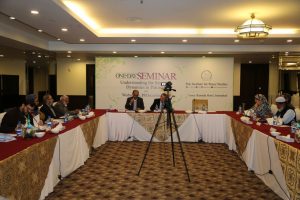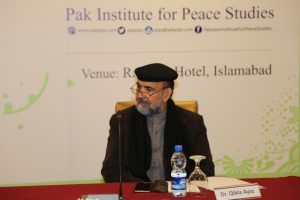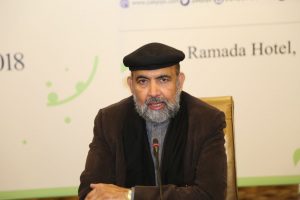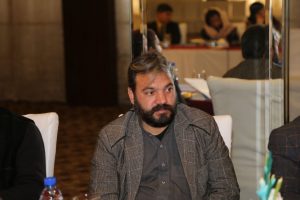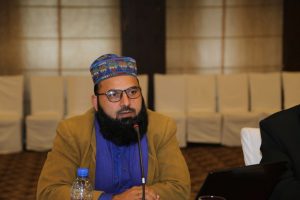‘Learning to live with differences can help curb sectarianism’
Sectarianism, the most ominous manifestation of extremism in the country, appears not only in the form of violence but also in the group thinking of people. To root it out, there is a need to promote a culture in which people learn to live with differences even if they do not agree with them.
These thoughts came in a daylong seminar “Understanding the sectarian dynamics in Pakistan”, on 19 December 2018, which was attended by around 30 religious scholars and experts.
The dialogue noted how sectarianism has become a major ailment in the country. PIPS research shows such a strong link between sectarianism and militancy, that they have been referred as flesh and blood. In addition to sect-based outfits, even militant groups are deeply sectarian in nature. This comes time and again in their targets and language.
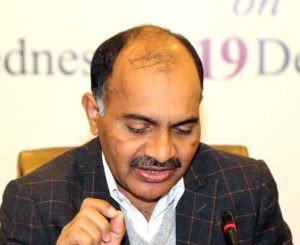 In introductory remarks to the dynamics of sectarianism in Pakistan, senior researcher PIPS Safdar Sial said that to some sectarianism is Pakistan’s structural problem, but to others, it reflects diversity in terms of faiths similar to other diversity in culture, geography, race and ethnicity.
In introductory remarks to the dynamics of sectarianism in Pakistan, senior researcher PIPS Safdar Sial said that to some sectarianism is Pakistan’s structural problem, but to others, it reflects diversity in terms of faiths similar to other diversity in culture, geography, race and ethnicity.
He presented that over the past several years, mainly starting from 2013, the incidents of sectarian violence – including sectarian-related terrorist attacks and armed clashes – have gradually decreased in Pakistan.
While this much is positive, the worry is a gradual ingress of sectarian and faith-based discrimination in individuals’ attitudes and behaviours in Pakistan. “Incitement of hatred, sectarian and communal violence, and persecution of minority sects and faith groups indicate that social polarization and discord persist in Pakistani society”, he said.
He further underlined some state and society-level initiatives which have focused on creating sectarian and communal harmony. These include the National Action Plan (NAP), which among other things, call for curbing sectarian violence.
 Germany’s ambassador to Pakistan Martin Kobler said sectarianism in Pakistan is not peculiar to this part of the world. Almost half a century ago, he said, Europe too was facing sectarian conflict. But Europe learnt from its mistakes, overcoming the bitterness of the past. So much so, he said, that today same curriculum of history is being taught in France and Germany. This was unthinkable merely half a century ago, he hinted.
Germany’s ambassador to Pakistan Martin Kobler said sectarianism in Pakistan is not peculiar to this part of the world. Almost half a century ago, he said, Europe too was facing sectarian conflict. But Europe learnt from its mistakes, overcoming the bitterness of the past. So much so, he said, that today same curriculum of history is being taught in France and Germany. This was unthinkable merely half a century ago, he hinted.
He said tolerance is about living with differences one may not necessarily agree with. “Tolerance hurts”, he admitted, but accepting to live with it is the way forward. One of the ways is to realize that a single person has multiple identities, based on gender, faith, ethnicity, likes, dislikes, and so on.
He said social harmony can be achieved via curriculum reform. He opined a reformed school curriculum can greatly bring about social cohesion. He also underlined significance of crisis of values the world over. Additionally, he also called upon engaging women in peace and development.
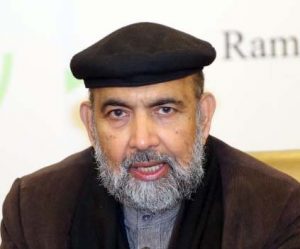 Dr. Qibla Ayaz, Chairman of the Council of Islamic Ideology (CII) agreed with ambassador’s view on learning lessons from European history. He said diversity should be celebrated to avert the social polarization. There is a dire need to focus upon ourselves, our own behaviour and attitude toward society, religion and people.
Dr. Qibla Ayaz, Chairman of the Council of Islamic Ideology (CII) agreed with ambassador’s view on learning lessons from European history. He said diversity should be celebrated to avert the social polarization. There is a dire need to focus upon ourselves, our own behaviour and attitude toward society, religion and people.
He referred to a recently-held international conference in Saudi Arabia in which religious scholars from different Muslim countries and of all sects agreed that rivalries in Middle East are not based on religious differences but on politics.
He admitted that the role of state comes into any debate on curbing sectarianism in the country. But as of now, what is important to understand is that all the institutions of the state back Paigham-e-Pakistan, which denounces violence. The document has been endorsed by scholars of all schools of thoughts.
 Meanwhile, Dr, Khalid Masud, Former Chairman of the Council of Islamic Ideology (CII) said because of the violence inflicted under sectarianism, the word “sect” often carries negative connotation in it. Even now, he said, the problem is the descent of those differences into violence.
Meanwhile, Dr, Khalid Masud, Former Chairman of the Council of Islamic Ideology (CII) said because of the violence inflicted under sectarianism, the word “sect” often carries negative connotation in it. Even now, he said, the problem is the descent of those differences into violence.
He hinted that sectarianism in Pakistan evolved into modern-day terrorism, rather than the other way around. Unfortunately, he said, we too have borrowed the western distinction of the world before and after 9/11, even though we started facing sectarian violence as much as in 1980s, he said. He called for promoting critical thinking and respecting difference of opinion.
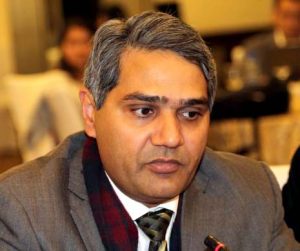 PIPS director Muhammad Amir Rana agreed that sectarian harmony is about creating an environment in which people live with other, despite different views. When it comes to sectarianism, he said, the issue is more than mere sectarian violence. He asked for admitting that group thinking on sectarian lines is commonly observed in different segments of society. Such thinking especially in professional lives hampers productivity. That is why, he reasoned, social cohesion is marked as one of the indicators of progress the world over.
PIPS director Muhammad Amir Rana agreed that sectarian harmony is about creating an environment in which people live with other, despite different views. When it comes to sectarianism, he said, the issue is more than mere sectarian violence. He asked for admitting that group thinking on sectarian lines is commonly observed in different segments of society. Such thinking especially in professional lives hampers productivity. That is why, he reasoned, social cohesion is marked as one of the indicators of progress the world over.
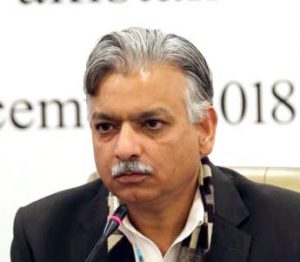 Khurshid Nadeem, columnist scholar, recalled history to explain extremism and intolerance in society prevailed due to politically-influenced religious explanations. He further underlined need to understand the difference between positive and negative aspect of sectarianism (maslak and firqa): maslak is based on healthy intellectual dialogues while firqa implies some political or personal interests.
Khurshid Nadeem, columnist scholar, recalled history to explain extremism and intolerance in society prevailed due to politically-influenced religious explanations. He further underlined need to understand the difference between positive and negative aspect of sectarianism (maslak and firqa): maslak is based on healthy intellectual dialogues while firqa implies some political or personal interests.
 Dr. Khadija Aziz, academic, argued that the differences have been aggravated to the negative, with the advent of modern technology; this should also be analysed. To some, sect-based differences reflected diversity, as much as of other identities.
Dr. Khadija Aziz, academic, argued that the differences have been aggravated to the negative, with the advent of modern technology; this should also be analysed. To some, sect-based differences reflected diversity, as much as of other identities.
Similarly, Saqib Akbar, founder of Al-Basirah Turst, emphasized that fine arts should be promoted to convert negativities into positives. Dr. Husn ul Amin, International Islamic University, Islamabad (IIUI) said “market dynamics” can count sectarian dynamics; in the market, all are at times or try to compete with others on mundane items of households.

The dialogue participants explored a range of issues behind sectarianism. Surely, one said, part of it has been externalized too, with conflicts in Middle East forcing groups to gravitate towards one or another school of thought. Yet, at the same time, what cannot be dismissed is that madrassahs in the country are bound to affiliate with one of the five boards, which are entirely sect-based.
The dialogue was attended by Dr. Husn ul Ameen, Islamic International University; Khursheed Nadeem, columnist; Islamic scholar; Saqib Akbar, chairman, Al-Basirah Trust; Amanat Rasool, religious scholar; Dr. Rashid Ahmed, Peshawar University; scholars Abdul Haq Hashmi, Syed Ahmed Banori, Akbar Hussain Zahidi, Maulana Atta ullah Shahab, Zia ul Haq Naqshbandi, among others.
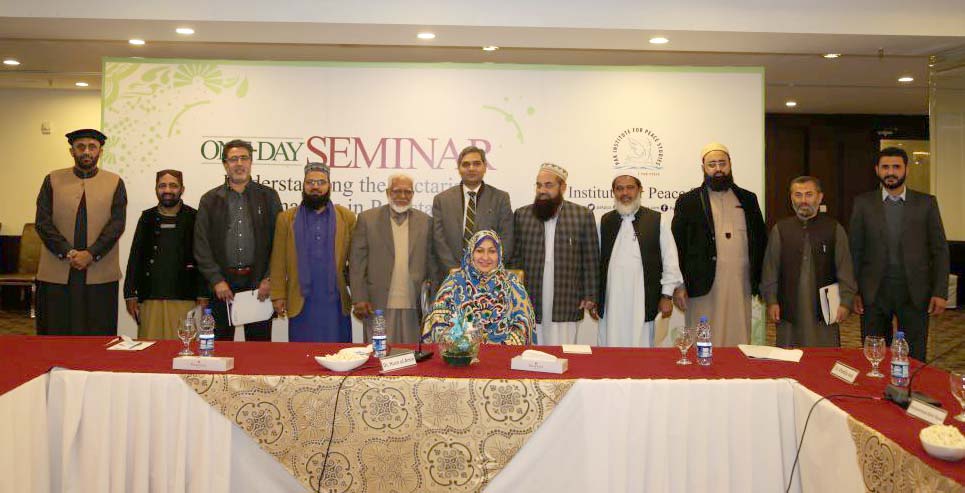
Media Coverage:
Dawn
https://www.dawn.com/news/1452437/seminar-discusses-different-forms-sectarianism-takes-in-pakistan
The News
https://www.thenews.com.pk/print/408715-sectarianism-ominous-manifestation-of-extremism
Urdu newspapers
Daily Express
https://www.express.com.pk/epaper/PoPupwindow.aspx?newsID=1105982390&Issue=NP_ISB&Date=20181220
Daily dunya
https://e.dunya.com.pk/detail.php?date=2018-12-20&edition=ISL&id=4345261_42638929
Roznama 92
Daily Ausaf
http://epaper.dailyausaf.com/popup.php?newssrc=issues/2018-12-20/69395/176412
Jehan Pakistan
Gallery:




